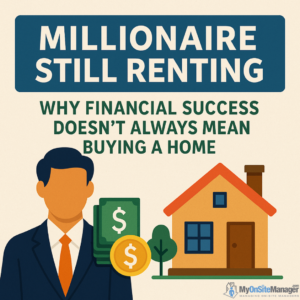In a society where homeownership is often seen as a key marker of adulthood and success, it might come as a surprise that someone in their late 30s with $2 million in savings is still renting. Yet that’s exactly the scenario explored in a recent MSN article. The subject’s situation has sparked a broader conversation: Is homeownership always the best next step, even for high earners?
This post breaks down the underlying reasons, misconceptions, and evolving realities behind choosing to rent—even when you’re more than financially able to buy.
A Changing Narrative: Why Renting Isn’t a Step Back
For decades, the “American Dream” has included homeownership as a milestone. However, in today’s economic climate, more individuals—even the wealthy—are opting to rent. Here’s why:
Housing Market Conditions
The housing market has seen record-breaking home prices over the past few years. In many major cities, homeownership may no longer offer the value it once did. With low inventory, inflated prices, and bidding wars still common in some regions, even well-off individuals hesitate to jump into the fray.
Cost vs. Value
Buying a home involves more than the sticker price. There’s the down payment, property taxes, maintenance, insurance, and unexpected repairs. For someone financially savvy, putting $1 million into a home might not offer the same return as keeping that capital in a diversified investment portfolio.
Lifestyle Flexibility
Homeownership can tie you to one location. If you value mobility—for career opportunities, travel, or personal freedom—renting keeps your options open. As remote work becomes more widespread, many professionals value the freedom to move and avoid being tied down by real estate.
Renting vs. Buying: The Financial and Emotional Equation
| Factor | Renting | Buying |
|---|---|---|
| Upfront Costs | Security deposit, first/last month’s rent | Down payment, closing costs, loan fees |
| Maintenance | Landlord responsibility | Full homeowner responsibility |
| Equity Building | None | Equity grows with mortgage payments |
| Tax Benefits | Limited | Mortgage interest/property tax deductions |
| Flexibility | High – easier to relocate | Low – requires selling or renting out the home |
| Stability | Depends on landlord/lease | More control and permanence |
The truth is, homeownership isn’t a one-size-fits-all solution. For some, the emotional security of owning a home is invaluable. For others, it’s a burden that limits opportunities.
What Experts Say
In the original article, financial planners suggest evaluating the why behind homeownership. Are you buying a house because it fits your lifestyle and goals? Or simply because it’s what everyone else is doing?
They recommend asking:
-
Will you stay in the home long enough to justify the costs?
-
How will buying affect your investment flexibility?
-
Does homeownership align with your career or family plans?
These are not just financial questions—they’re lifestyle questions.
Emotional Pressure and Societal Expectations
People often feel embarrassed or insecure about renting into their 30s or 40s, especially when peers are buying homes and settling down. But comparing your financial journey to others can lead to poor decisions.
If you have $2 million saved and are still renting, you’re not behind—you’re being intentional. You’re taking your time, evaluating your options, and aligning your choices with your life goals, not society’s expectations.
When Renting Makes More Sense
Here are a few scenarios where renting is often a better move—even for millionaires:
-
You’re unsure where you want to settle permanently
-
Your job or industry may require relocation
-
You prioritize investing in stocks, businesses, or alternative assets
-
You want to avoid the hassle and risk of property upkeep
-
You’ve already achieved financial independence and value peace of mind over status symbols
Final Thoughts: Freedom Over Frustration
Having $2 million and still renting isn’t a failure—it’s a choice. One that reflects a nuanced understanding of personal finance and life goals. Homeownership is just one of many paths to stability and wealth. And in some cases, not owning a home might actually offer more freedom, less stress, and better returns.
So if you find yourself in a similar position—wealthy, responsible, and still renting—don’t let societal norms make you feel “stuck.” You’re not behind. You’re just playing the game differently—and wisely.
Source:
MSN: I’m in my late 30s and have saved $2 million but I still rent. Am I stuck forever?

